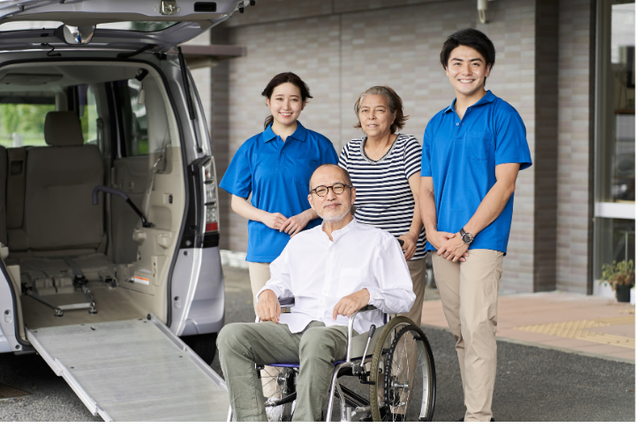Easily Accessible and Affordable Medical Transport Options for Seamless Wellness Support
In the realm of healthcare, the accessibility and cost of clinical transport are critical in making certain individuals can access the treatment they require when they need it. The ability to effortlessly browse transportation choices can considerably affect a person's capacity to receive prompt medical attention, follow-up care, and total wellness. From non-emergency clinical transportation services to cutting-edge options like telehealth, the landscape of medical transportation is evolving to satisfy the varied needs of individuals. Thinking about the importance of this facet in health care distribution, exploring the range of alternatives available ends up being important for dealing with gaps in ease of access and cost.
Non-Emergency Medical Transport Provider

These solutions are staffed by trained specialists who focus on individual convenience and safety throughout transportation. Vehicle drivers are geared up to take care of people with differing clinical requirements and guarantee that all journeys are smooth and hassle-free - Medical Transportation Services Near Me. Furthermore, non-emergency medical transportation services often make use of customized vehicles that are wheelchair-accessible, making them suitable for a wide variety of patients with different movement needs
Volunteer Chauffeur Programs
Volunteer driver programs are critical in providing transportation aid for individuals in demand of non-urgent treatment. These programs rely upon the kindness of volunteers that donate their time and lorries to help transportation people to and from medical consultations. By utilizing volunteer drivers, organizations can offer an economical solution for individuals that might not have access to dependable transportation.
One of the crucial benefits of volunteer chauffeur programs is the personalized treatment and focus that individuals obtain. Unlike traditional transportation services, volunteer drivers often establish a rapport with the individuals they aid, producing a helpful and thoughtful atmosphere during what can be a stressful time. Additionally, volunteer vehicle driver programs can help bridge the gap for individuals residing in underserved or rural areas where public transport choices may be restricted.
Public Transport Options

One of the vital advantages of public transport is its prevalent accessibility in country and urban areas alike. This comprehensive network permits patients from varied backgrounds to travel to clinical visits straight from the source with relative convenience. Furthermore, public transport systems are usually outfitted to suit people with disabilities, offering accessible travel choices for those with flexibility challenges.

Ride-Sharing and Transport Network Firms
The evolution of contemporary transport options for clinical purposes expands past traditional public systems like trains and buses to encompass the innovative realm of ride-sharing and transportation network firms. Ride-sharing solutions such as Uber and Lyft have actually revolutionized the way individuals take a trip to clinical consultations, supplying comfort and flexibility to patients who might not have access to their automobiles or traditional public transport. These platforms enable customers to request a trip with the touch of a switch on their smartphones, offering door-to-door service that can be especially useful for individuals with wheelchair obstacles or those calling for assistance.
Transportation network business (TNCs) have also played a considerable duty in linking the void in medical transportation services. Companies like Veyo and RoundTrip specialize in non-emergency clinical transport, dealing with clients who need a greater degree useful throughout their trips to medical facilities. By partnering with doctor and insurance firms, TNCs guarantee that view it now individuals can access prompt and trustworthy transport remedies, inevitably adding to improved health and wellness results and client fulfillment.
Telehealth and Digital Consultations
Enhancing health care accessibility and ease, telehealth and digital appointments have actually arised as pivotal components in modern-day clinical practices, changing the method clients connect with healthcare carriers. This method not just conserves time and decreases transportation costs for individuals yet additionally improves the overall efficiency of medical care delivery.
Additionally, telehealth plays a critical function in expanding clinical solutions to underserved areas, country areas, and individuals with minimal flexibility. By damaging down geographical barriers and raising medical care outreach, telehealth advertises very early intervention, continuity of treatment, and client interaction. As innovation remains to development, telehealth is poised to play an increasingly significant role in shaping the future of medical care shipment, cultivating better wellness outcomes and client complete satisfaction.
Final Thought

From non-emergency medical transport services to cutting-edge services like telehealth, the landscape of clinical transport is developing to satisfy the diverse needs of people.Non-Emergency Medical Transportation Provider promote the safe and prompt transportation of people calling for non-urgent clinical treatment to and from health care centers.The evolution of modern transportation options for clinical purposes extends past traditional public systems like trains and buses to encompass the cutting-edge realm of ride-sharing and transportation network companies.Transportation network companies (TNCs) have actually also played a significant duty in linking the gap in clinical transportation solutions. Non-Emergency Medical Transportation Services, Volunteer Driver Programs, Public Transport Options, Ride-Sharing and Transportation Network Firms, and Telehealth and Virtual Consultations all play a critical role in addressing transportation obstacles to healthcare accessibility.